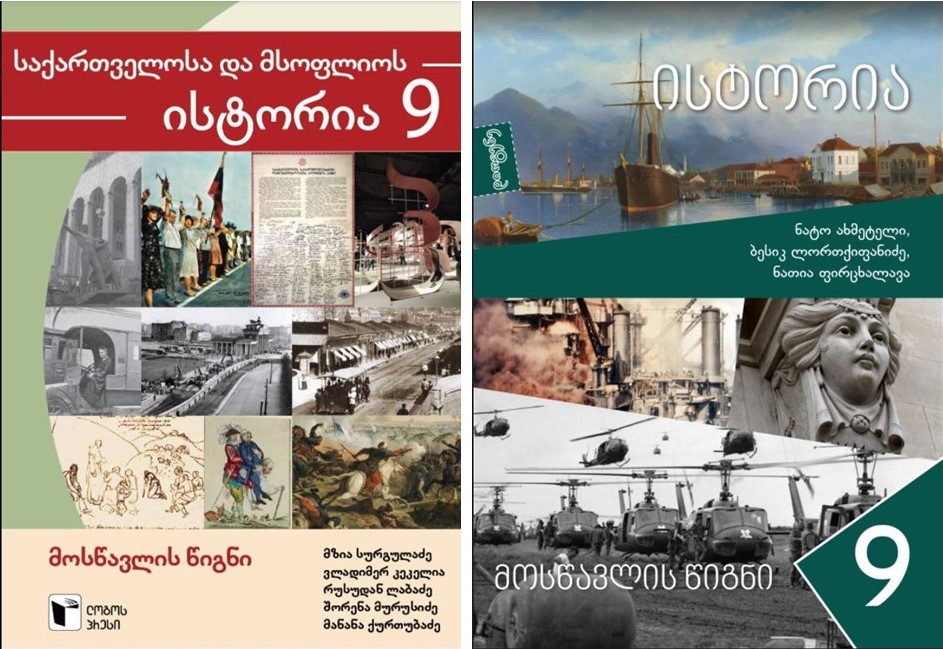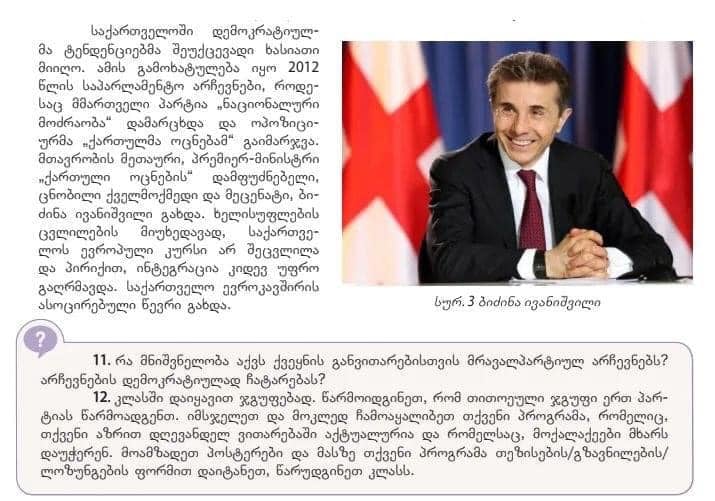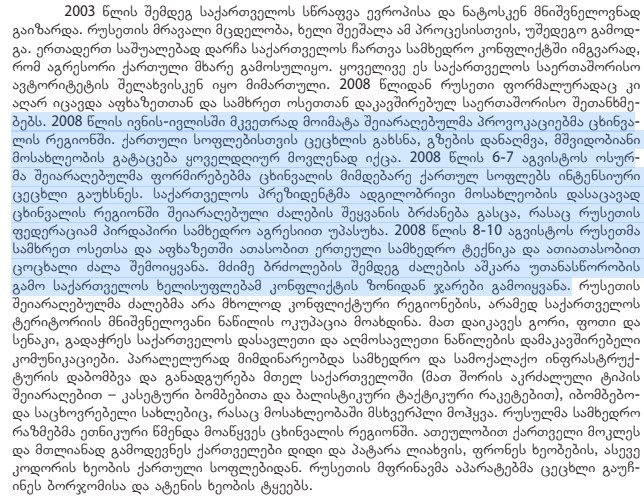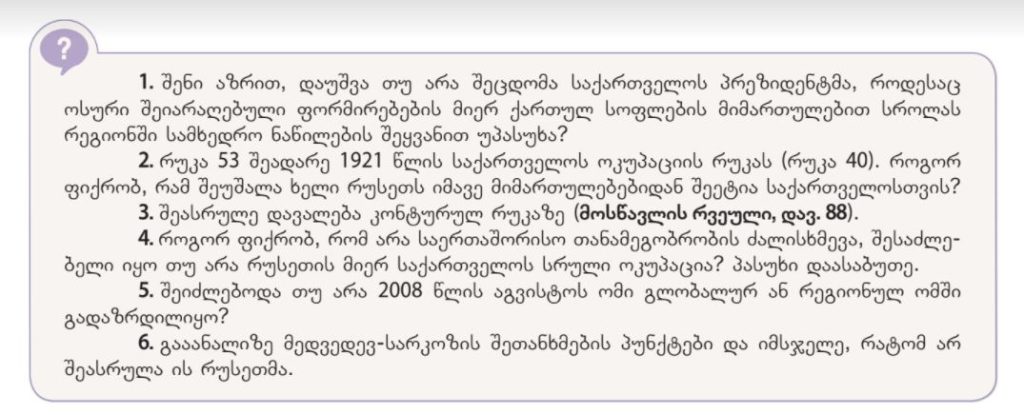How should the modern history of Georgia be taught?
Scandal over history textbooks in Georgia
The 9th grade history of Georgia textbook became the focus of news programs after a photo of one of the pages of the book was posted on Facebook. The chapter featured Bidzina Ivanishvili, the founder of the Georgian Dream party. In the textbook, Ivanishvili was referred to as a “philanthropist and patron of arts”.
In a highly polarized Georgian society, the mention of an informal ruler in a history book sparked heated debate in the media and on social media.
In addition, critical readers have found other controversial entries in the textbook, which relate to the most important events in the modern history of Georgia – the August 2008 war and the Rose Revolution. Many believe that the material presented in the textbook is quite pro-Russian.
As a result, for the last few days, heated debates about the history books have continued. The opposition Droa movement organised a protest, demanding the removal of the textbooks from the school curriculum.
What problem do the critics see in the book and how do the authors of the book and their advocates explain the controversial entries? JAMnews collected the main arguments of both sides.
Which textbooks and sections have become controversial?
Two 9th grade history textbooks sparked a wave of controversy.
One of them is published by the Diogenes publishing house, the other – by the Logo Press. Both are officially approved for the school curriculum.
The book published by The Logos Press was approved in the summer of 2021, and the book published by Diogenes – last year.
9th graders began studying history with these textbooks in the current, 2021 school year. That is, for almost half a year, students have been studying with these books.

Several sections of the textbooks sparked controversy – namely, those concerning information about Bidzina Ivanishvili, the founder of the ruling Georgian Dream party, the 2003 Rose Revolution and the August 2008 war.
Questions are triggered by selected terms, assessments, and interpretations that are used in the description of some events.
The disputed passages are more frequently found in Diogenes’ book.
What is written about Bidzina Ivanishvili?
The passage about Bidzina Ivanishvili is preceded by a sentence which concludes that “democratic tendencies in Georgia have become irreversible, as evidenced by the 2012 parliamentary elections, when the ruling party National Movement was defeated and the Georgian Dream won”.
The authors of the textbook then say that “philanthropist and patron of the arts” Bidzina Ivanishvili came to lead the country.
The following sentence says that after the victory of the Georgian Dream the country’s “integration into Europe deepened”. Historians cite the fact that in 2014, Georgia signed an association agreement with Europe.
Bidzina Ivanishvili, the founder of the Georgian Dream, a well-known philanthropist and patron of the arts, became the head of the government, the Prime Minister. Despite the change of government, Georgia’s European course has not changed and, conversely, integration has deepened. Georgia has become an associate member of the European Union”, the 9th grade history book reads.
For many, such wording turned out to be unacceptable.

In the history book of the Logo Press, the word patron is not found. There, Ivanishvili is referred to as a “businessman, philanthropist and politician”.
The entry about Bidzina Ivanishvili can also be found in the subsection entitled “Georgia’s western course is unchanged”. In the introduction to this section, it says that after the democratic change of government in Georgia on October 1, 2012, “the new government continued its Western course, which is reflected in the country’s rapid accession to NATO and its European integration”.
What do the textbooks say about the August 2008 war?
Diogenes’ handbook, entitled “What caused the 2008 Russia-Georgia War”, states that Georgia’s aspirations for Europe and NATO had grown significantly since 2003, and Russia had tried in vain to disrupt the process. The book also mentions frequent provocations:
“On August 6-7, 2008, Ossetian armed groups opened intense fire on Georgian villages near Tskhinvali. The President of Georgia ordered the deployment of armed forces in the Tskhinvali region to protect the local population, to which the Russian Federation responded with direct military aggression. On August 8-10, 2008, Russia deployed thousands of units of military equipment and tens of thousands of troops to South Ossetia and Abkhazia”.

Critics see the problem with the book implying that Russia was merely responding to Georgia’s actions, and only mobilised troops after the Georgian Armed Forces entered Tskhinvali.
At the end of this section, the book asks students to discuss the following question: “Did the President of Georgia make a mistake when he responded to the firing on Georgian villages by Ossetian militias by bringing military units into the region?”
This question is also problematic for the critics of the textbook, because the question itself indicates that such a response was, indeed, a mistake.

Critics say the information contained in Diogenes’s history textbook on the 2008 war has a pro-Russian narrative – the book does not say “Georgia started the war”, but does indicate that Saakashvili’s actions prompted Russia to send troops to Tskhinvali.
How is the Rose Revolution presented in textbooks?
In the Diogenes textbook, the chapter on Mikheil Saakashvili and the Rose Revolution states that after the election of Mikheil Saakashvili, the new government managed to tackle corruption, carry out reforms, and send a major blow to the criminal world.
The evaluation text which follows the entry has also sparked controversy:
“The Ergneti market was closed due to the fight against corruption and smuggling, which hindered the development of Georgian-Ossetian relations”.
“Several mistakes have also been made [by Saakashvili’s government]. For example, with the successful fight against corruption, some crackdowns began, several killings were carried out under the pretext of fighting crime, but high-ranking officials of the Ministry of Internal Affairs were not punished, Prime Minister Zhvania died under unclear circumstances, 99% of court cases were won by the prosecutor’s office and human rights were often violated”.
What arguments do the textbook critics have?
Leaders of the opposition Droa party say the textbook is propagandistic and is tailored to the Georgian Dream’s messages and agenda. On Facebook, Droa announced the beginning of a protest movement against the entry about Bidzina Ivanishvili into the history textbooks.
Not only politicians criticise the textbooks.
Historian Beka Kobakhidze, who has read the controversial textbooks, says he could not call the textbook “propaganda”, although, according to him, “the devil is in the detail”. Kobakhidze said that there are many “strange” details in these books, which makes them biased.
For example, when talking about Georgia’s cultural diversity, after describing Saakashvili’s rule, one of the books goes on to present an interview with Rita Saakyan who lives in a so-called Georgian ‘Italian courtyard’. The historian does not believe that this is just a coincidence.
According to Kobakhidze, another one of such “details” is the photo of Mikheil Saakashvili – where he is depicted ‘half-sober’: “This is not really the best, and not even an average photo of Saakashvili – while the photo of Bidzina Ivanishvili is quite presentable”.
Beka Kobakhidze says that economic and social achievements and the results of modernization have been taken away from the Rose Revolution.
“In my opinion, it is fair to say that the criticism of the Rose government is included in one paragraph and everything is written there normally, but the achievements of the Rose government are reduced to the defeat of crime and corruption. Nothing more is written there”.
According to Kobakhidze, it is interesting to observe how the role of leaders is presented – where the personal factor is emphasized and where it is not.
“For example, it writes directly and personally about Shevardnadze, that a number of foreign policy breakthroughs took place during his time. The book also writes about Saakashvili’s period and how in 2004 the EU developed a new neighborhood strategy (i.e. the EU developed it and not Georgia achieved it). Intensive cooperation with NATO has started and it is written in brackets that Shevardnadze made the application to it. The chapter on Ivanishvili’s era says that the country continued its pro-Western course and signed the Association Agreement, although it is no longer written in parentheses that this agreement was prepared during Saakashvili’s time”.
For Beka Kobakhidze, the presentation of the August war is also controversial:
“The story is based on Tagliavini’s conclusion. I wonder, does the Georgian state share this narrative or should it share it? According to the story, Ossetian separatists were shooting at Georgian villages, Saakashvili deployed troops and only then the Russians entered. As a historian, not as a citizen, I wonder if that’s the position that Georgia presents in the international arena?”
How the Ministry, book publishers and authors respond to criticism
The Ministry of Education and Science of Georgia does not share the criticism. The position, which was issued in writing by the agency, states that the 9th grade textbook of Georgian history describes the historical processes correctly, competently and comprehensively:
“The textbooks talk about all the political leaders of the years of independence and the period of their activities. Therefore, naturally, we are talking about the fact that in 2012 the government changed in a democratic way. Also, the unchanging of the country’s western course, which was strengthened by the Association Agreement, is clearly emphasized”, the position of the Ministry reads.
Nata Akhmeteli, one of the authors of Diogenes’ textbook, said in an extensive Facebook post that she did not see a problem with the record of the August war. Akhmeteli quotes an excerpt from the textbook about the war:
“Is it not clear from this text that Russia was behind the Ossetian military formations?”
As for the question about whether the President of Georgia made a mistake when he responded to the shooting by Ossetian armed groups in the direction of Georgian villages by bringing military units into the region, Akhmeteli writes that this is a discussion question, students should express their position on it and discuss it:
“Does starting a discussion mean taking any position? Why do you think a child will definitely respond positively and not the other way around? Are these questions for discussion, as they are in many other stories?”
Should modern history be taught?
Some historians think that the criticism of the authors of the textbook is undeserved. On the contrary, they need solidarity, because if they do not have support, in a few years, there will be no people to write the modern history of Georgia.
Historian, scientist, David Jishkariani tells JAMnews that the discussion that has now begun around the textbooks is, in fact, political and not scientific:
“Every textbook that has been published in Georgia so far, had its last chapter about the recent history written with the same rhetoric as this one. There is no history textbook that has been written so far, where the last chapter was written from a different perspective”.
Historian Irakli Khvadagiani, a researcher at the Soviet Past Research Laboratory (SOVLAB), says the same thing:
“There is such a big difference of opinion around the processes of the last 10-12 years, it is such a hot topic, no one can write in a wording that does not lead to questions and dissatisfaction. Because it is political to evaluate the current processes, to try to analyze them. You can not escape subjectivity, because you do not have the distance, you do not have the opportunity to discuss these processes as complete”.
Historian ask other questions, saying that the main discussion should be whether modern history should be taught in schools at all.
“If it is not to be taught, then what should we do with recent history?”, says Davit Jishkariani.
Publicist Davit Zurabishvili believes that “it is in principle inadmissible to evaluate the current political processes and the relevant actors in school textbooks”.
According to Zurabishvili, in the current process there are always not just differences of opinion, but also very sharp controversies:
“In this situation, a neutral text simply can not be written and all assessments will be an indoctrination that will turn the children to either side. It is easy to imagine that some teachers will be pro-government, others will be pro-opposition, and they will teach the curriculum according to that bias. Therefore, the textbook should not, in principle, include assessments of the current events and personalities of the current political process”.
Zurabishvili believes that the recent history textbook should end with Zviad Gamsakhurdia declaring Georgia independent:
“Because the rest of the period requires more or less time for a more or less objective assessment (it is never a completely objective history). The participants of this period are still alive today, many of them are current politicians and the interpretations of their activities are still causing heated debates and conflicts”.
Irakli Khvadagiani says that the common national curriculum and standard should be taken into account when talking about recent history, where it starts and where it ends:
“What does a student need, what information should he/she get out of this class, what basic knowledge and skills should he/she acquire? We should not offer them knowledge of controversial and politicized topics within the subject of history – it can be done during the civic education and extracurricular activities. Such activities will help students of this age and grade to understand the processes around them, so that when they get civil rights in the future, they will know their place in the society”.
How should we learn history?
Last year, the Soviet Past Research Laboratory studied how Soviet history is taught in schools. They also touched on recent history.
Irakli Khvadagiani says that Georgian schools devote much more time to the history of antiquity and the Middle Ages than to the 19th and 20th centuries:
“While the knowledge of what has happened in recent centuries is of particular importance for understanding where we are today, what challenges we are facing and where our place is, that dimension, the problems we are facing, have nothing to do with what was happening in the 9th or 12th century. When you [the state] ignore it, you spend less time teaching it, a student who graduates from school and becomes a full-fledged citizen will be disoriented, will not understand what the modern state is, what the main threats are facing us, where we are, and where our place is”, Khvadagiani said.
According to him, this primarily concerns the understanding of the Russian issue:
“What knowledge do we give in textbooks about Russia as our strongest threat when the whole gravity of teaching history has shifted to Eastern expansion?!”, the historian asks.
Khvadagiani points out that the last two centuries which should be covered more extensively in schools lack reliable scientific research:
“We have a serious vacuum. In order to have our imaginary, desirable guide and no longer hear such claims, there must be relevant, sufficient, even more than sufficient knowledge. But, you will not find a topic from this period on which you can say that there is new, orderly, fundamental knowledge – papers, documents, sources. It is a complete disaster in this regard”.
Davit Jishkariani also shares this opinion and notes that there are very few scientific papers and serious research in this field because of the lack of financing:
“It would be good if the political groups, no matter which side they are on, say somewhere at least once what funding historical science receives in order to conduct qualified research. The textbook is powered by scientific research, and no one sponsors scientific research. Therefore, the authors do not have many documents, sources, materials from which they can make accurate analysis”.
According to historians, another problematic link in this chain, is the school teachers:
“The printed textbook is a guide that should be complemented by other components – teacher, additional resources, databases, documentaries, tours, etc. There is a deadlock in this regard as well – we do not like it, we criticize it, but how to do it, everyone is silent about it, because it requires a lot of resources and, most importantly, it should be a priority for the state”, Irakli Khvadagiani told us.
What is the priority for the state?
“Mr. Bidzina Ivanishvili is a person of historical significance and a great philanthropist. Therefore, Mr. Bidzina Ivanishvili must be represented in the history of modern Georgia with dignity and this will be the case in the relevant textbooks”, Mikheil Chkhenkeli, the Minister of Education of Georgia said in response to the discussion and excitement caused by the history books.
Irakli Kobakhidze, Chairman of the Georgian Dream, said that:
“[The textbook] lacks a reference to Saakashvili being a criminal president whose guilt will be recognized by the Georgian judiciary. I think such records should be added to the textbook, it will be a statement of facts”.
Sozar Subari, a member of the Georgian Dream, who stressed that he himself is a historian and understands the importance of history, said that the textbook “lacks a record of traitors”:
“History does not only know the heroes, it also knows the traitors. Therefore, the history textbook should include the names of the traitors who gave Russia a chance to occupy 22% of Georgia’s territory and then accused Georgia of occupying it in Strasbourg”.
He also said that “Bidzina Ivanishvili is, indeed, a patron, who has saved and restored more than 900 churches”. “No single person could do greater work than he did in the history of any country”.
Another member of the ruling party, Shalva Papuashvili, who heads the education committee in parliament, said it was an attempt by the United National Movement to rewrite history:
“When the UNM focuses on whether Bidzina Ivanishvili should be mentioned alongside Mikheil Saakashvili and Zurab Zhvania in modern history, they are not fighting to remove information about Bidzina Ivanishvili from the book, but to remove the role of this man played in our history”.


















